I Don’t Hate Nobody Because Life Is So Short
“When I became a citizen it was one of the happiest days in my life . . . [the US] is the best country in the world, and I’m part of it.” – Tibor Rubin
He survived more than a year in a Nazi concentration camp, was awarded the Medal of Honor for actions in Korea, endured thirty months as a Chinese POW, and upon his release became a US citizen.
The Horror of Mauthausen
"When I came to America, it was the first time I was free,” Tibor "Ted" Rubin frequently told family, friends, and interviewers.
The 14-year-old Hungarian Jew had spent 14 months at Mauthausen concentration camp, where he saw men, women, and children die from starvation, disease, and exposure. After enduring the horrors of the Holocaust, young Rubin made a solemn pledge that he would leave war-ravaged Europe and become an American.
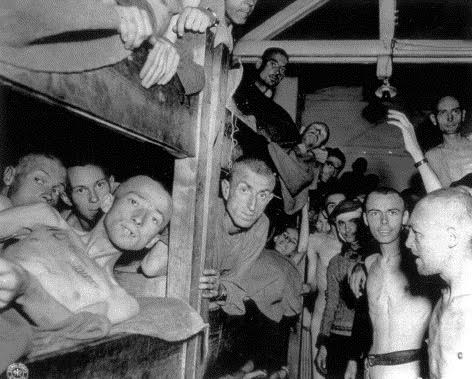
Prisoners at the Mauthausen Concentration Camp (PC: Holocaust Museum)
On May 5, 1945, he watched as the “Greyhounds” - soldiers of the 11th Armored Division, US Third Army - liberated him and thousands of others from the inhumane camp.
“The American soldiers had great compassion for us. Even though we were filthy, we stunk, and had diseases, they picked us up and brought us back to life,” he remembered. It was at that moment that he knew he would someday become a US soldier.
"This was something we never forget. I have a debt to pay, so I made a promise. 'Lord help me if I ever go to America I gonna become a G.I. Joe.,'" he said in a 2005 Medal of Honor interview.
With his parents dead - his father had perished at Buchenwald and his mother and younger sister had been gassed at Auschwitz - Rubin left for America.
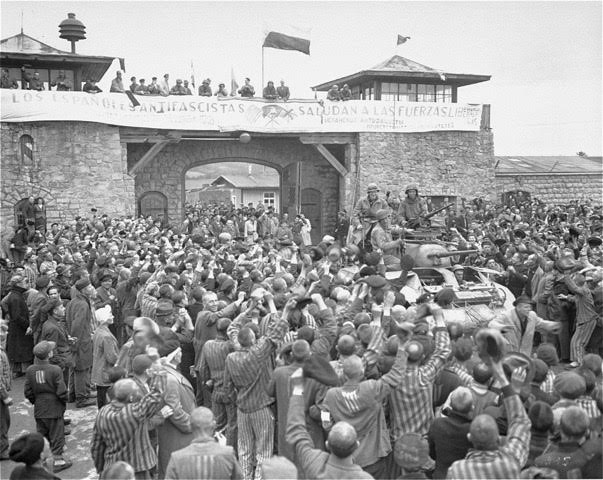
A photograph taken on May 6, 1945, the day after the liberation of Mauthausen concentration camp, shows prisoners surrounding an M8 Greyhound armored car. The 11th Armored Division, US Third Army, liberated the camp on May 5, 1945, and General Dwight D. Eisenhower ordered that the event be re-enacted the next day so that more photographs could be taken of the atrocities committed by the Nazis (PC: National Archives).
The Korean War
Arriving in America in 1948, Rubin worked odd jobs and repeatedly tried to enlist in the Army. But his English wasn’t good enough.
In 1950, however, he got his lucky break. With a little “unofficial” help from a few American buddies, he passed the English language test. He was admitted into the Army and was soon on his way to Korea.
As a member of I Company, 8th Cavalry Regiment, First Cavalry Division, PFC Rubin fell under the wrath of the company First Sergeant, a man described by fellow soldiers as an “extreme anti-Semite.” The ruthless Staff NCO, who made no qualms about verbally assaulting the 21-year-old PFC, frequently “volunteered” him for the most dangerous missions.
“He would send me to the most difficult positions so that I would be killed,” Rubin recalled. “It scared the hell out of me. I couldn’t even hold my rifle, but I still went.”
They Looked Like Ants
On July 23, 1950, Rubin’s sadistic First Sergeant sent him on what many would later say was a suicide mission. With his company in retreat, Rubin, now a corporal, was ordered to stay behind and defend a vital hilltop.
Alone and without support from other units, Rubin was hit by an overwhelming North Korean force.
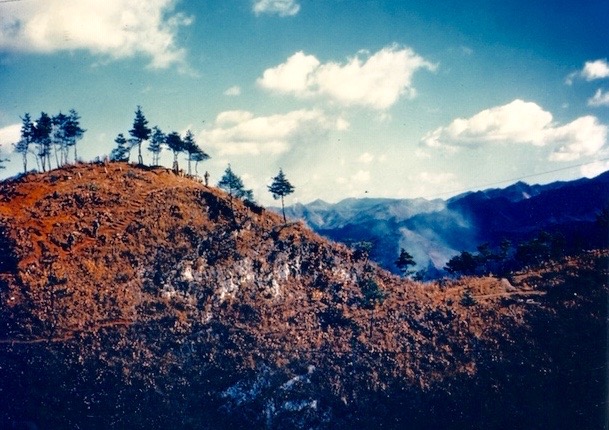
A contested hilltop in Korea, 1950 (Trumanlibrary.gov)
“There were so many, they looked like ants,” Rubin recalled in an MOH video. “I didn’t have too much time to get scared, so I went crazy. I was like a machine, a robot. I ran around to every foxhole on the hill and started throwing hand grenades and shooting my rifle to make as much noise as possible so the North Koreans would think they were fighting more than one person.”
According to his Medal of Honor citation, “He inflicted a staggering number of casualties on the attacking force during his personal 24-hour battle, single-handedly slowing the enemy advance and allowing the 8th Cavalry Regiment to complete its withdrawal.”
But his First Sgt. was not impressed. Despite the fact that Rubin had been recommended for the Medal of Honor, the enraged Staff NCO refused to submit the paperwork and would repeatedly "misplace" every recommendation (Medal of Honor, Distinguished Service Cross, and Silver Star) that Rubin was nominated for.
Nightmare at Death Valley
By October 1950, with the North Koreans retreating and the Americans advancing deep into enemy territory, the war appeared to be all but over. The Chinese, however, had other ideas.
Sneaking across the North Korean border during October and November, tens of thousands of Chinese unleashed a massive offensive against US forces in North Korea. In what became known as the Battle of Unsan, two Chinese divisions attacked the 8th Cavalry Regiment.
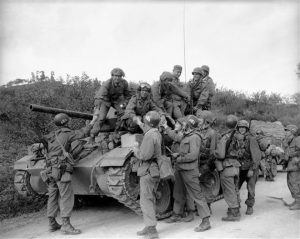
U.S. paratroopers greet First Cavalry Division tank crewmen at Sukchon, North Korea, in 1950. A week later the division's 8th Cavalry Regiment fought against two Chinese divisions at Unsan, suffering heavy casualties. (PC: AP).
Outnumbered and outgunned, Rubin and hundreds of American soldiers were surrounded, taken prisoner, and marched for weeks to the camp they would forever call “Death Valley."
A POW
Over the next thirty months, Rubin and his fellow prisoners endured the barbaric conditions of the remote camp, located in the remote mountains of North Korea. Suffering from extreme cold, deprivation, and physical and mental torture, men starved to death, succumbed to disease and exposure, and simply lost the will to live.
Rubin, however, never lost hope. He became a beacon of optimism and strength for all the men in the camp. Frequently risking his life to steal food and medicine, the seemingly fearless corporal raised the morale of the prisoners and saved the lives of forty men.
“He’d go out of his way . . . to help us survive,” fellow inmate Leo Cormier said. "He saved a lot of GI's lives. He gave [us] courage to go on living when a lot of guys didn't make it. He saved my life when I could have laid in a ditch and died -- I was nothing but flesh and bones."
James Bourgeois remembers Rubin boiling snow and using the steaming water to clean his wounds and bandages. "At one time my wounds got so infected he put maggots in them to prevent gangrene from setting in. [He] not only saved my left arm -- which I have full use of today -- but also my life.”
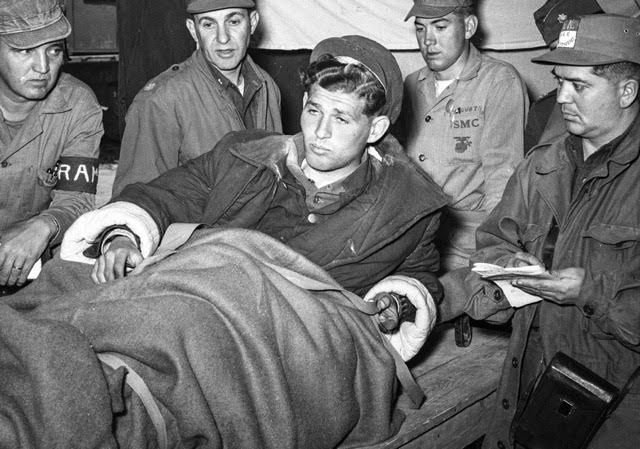
Tibor Rubin, after his release from 30 months of Chinese captivity, talks to reporters at Freedom Village, April 1953 (PC: Stars & Stripes).
Rubin’s nightmare of Chinese captivity came to an end in 1953 when the 23-year-old corporal and countless other emaciated, sick, and wounded Americans were repatriated during "Operation Little Switch," an exchange of prisoners from April 20 to May 3, 1953.
His release and reunion with his family back home, however, was bittersweet. Recalling his buddies that perished, he told Soldiers Magazine, “Some of them gave up, and some of them prayed to be taken.”
When asked years later about his feelings toward those who had imprisoned him during the Holocaust and Korean War, he replied, "I don’t hate nobody because life is so short. If you feel hate for your fellow man, you’ll only hurt yourself.”
The Medal of Honor
After returning to the States, Rubin got a job working at his brother’s Long Beach liquor store, married, had two children, and was all but forgotten as an American war hero.
But on September 23, 2005, after a Congressional review of the records of 137 Jewish veterans, Tibor Rubin was awarded the Medal of Honor, becoming the only Holocaust survivor to receive America’s highest award for valor.
When asked about his wartime experiences and MOH, he said, "The real heroes are those who never came home. I was just lucky. This Medal of Honor belongs to all prisoners of war, to all the heroes who died fighting in those wars."
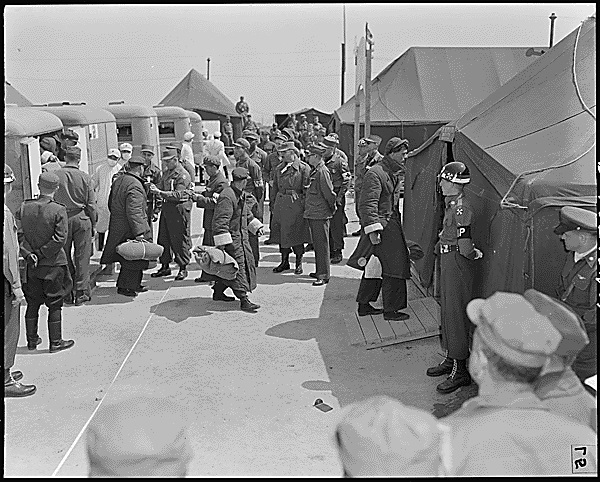
POWs at Panmunjom during Operation Little Switch, April 1953 (National Archives).
Postscript
Rubin passed away at his home in Garden Grove, CA, on December 5, 2015. He was 86.
On May 10, 2017, the patients and staff of Long Beach Veterans Hospital, where Rubin had volunteered more than 20,000 hours of his time, renamed the facility the "Tibor Rubin VA Medical Center” in his honor.
Remarkably, after all Mr. Rubin had endured throughout his life - the horrors of the Holocaust, the suffering and death of the Korean War, and the brutality of Chinese imprisonment – he never lost faith in God or his fellow man.
And that, more than anything else, is his legacy.
Top/Feature picture: Cpl. Tibor Rubin, US Army (Congressional Medal of Honor Society)
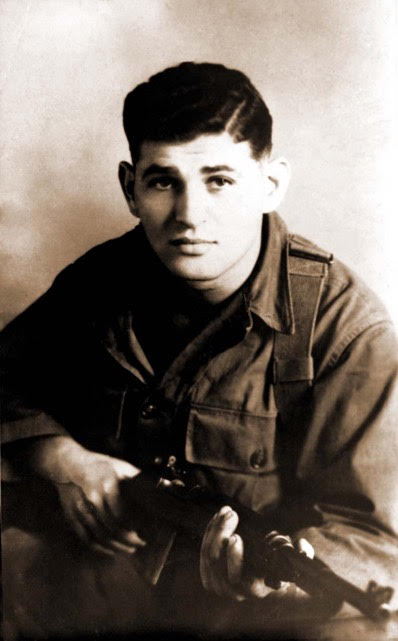




This had me in tears. If only people realized what a wonderful country we live in . With the civil unrest now we need to hear stories of heros. He was a hero! My Dad and step Dad both served in the Korean war.
Thanks for your heartfelt comments, Peggy. I salute your father and stepfather for their service in Korea. Their sacrifices were not in vain!
Yes, we do need more stories of heroes. I’m glad to do my small part in sharing them.
Why was this great American Veteran , not buried at Arlington Cemetery ? A war veteran ,American Citizen , awarded the MOH ……….?
As far as I know, this was where he wanted to be buried.
Appreciate your reading the blog and commenting on this great American hero!
What a stellar human being!
“That one indeed is a man who, today, dedicateth himself to the service of the entire human race.” (Baha’u’llah, Tablets of Baha’u’llah, p. 167)
If we all had but half of Tibor Rubin’s dedication to humanity, I dare say this planet would live as one country and one people.
Thanks for reading and sharing your thoughts, Darrell.
You’re exactly right – Tibor Rubin was a stellar human being. We need more men like him today.
Again- thank you!
Thank you.❤🇺🇸❤
Thank you for reading the story and taking the time to write, Nancy. We appreciate it!
Thanks Ned for these unbelievable stories you send out I resend them to all my Facebook friends and they all read them every day. What possesses these men to do what they do we will never know but you sending these stories out makes people aware of what men go thru in times of war thanks again and keep them coming Lou Vasilow
Thanks, Lou. I really appreciate your feedback and support. Thanks also for sharing these stories with your friends.
It’s so important to remember our veterans and their families. We owe them so much, and as you rightly say, people need to be aware of what they go through.
There are so many more stories out there that have been forgotten by history, and I’m glad to do my part to help people remember these brave men and women.